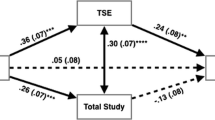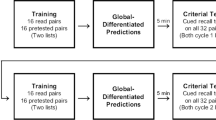ABSTRACT
We conducted the present study to investigate whether college students adjust their study strategies to meet the cognitive demands of testing, a metacognitive self-regulatory skill. Participants were randomly assigned to one of the two testing conditions. In one condition we told participants to study for a test that required deep-level cognitive processing and in the other to study for a test that required surface-level cognitive processing. Results suggested that college students adjust their study strategies so that they are in line with the cognitive processing demands of tests and that performance is mediated by the study strategies that are used.
Similar content being viewed by others
References
Andrews, J., Violato, C., Rabb, K., & Hollingsworth, M. (1994). A validity study of Biggs' three-factor model of learning approaches: A confirmatory factor analysis employing a Canadian sample. British Journal of Educational Psychology, 64, 179–185.
Biggs, J. B. (1978). Individual and group differences in study processes. British Journal of Educational Psychology, 48, 266–279.
Biggs, J. B. (1985). The role of metalearning in study processes. British Journal of Educational Psychology, 55, 185–212.
Biggs, J. B. (1987). Study process questionnaire manual. Student approaches to learning and studying (Report No. ISBN-0-86431–002-1). Hawthorn, Australia: Australian Council for Educational Research (ERIC Document Reproduction No. ED308 200).
Carver, C. S., & Scheier, M. F. (1981). Attention and self-regulation: A control theory approach to human behavior. New York, NY: Springer-Verlag.
Craik, F. I. M., & Lockhart, R. S. (1972). Levels of processing: A framework for memory research. Journal of Verbal Learning and Verbal Behavior, 11, 671–684.
D'Ydewalle, G., Swerts, A., & De Corte, E. (1983). Study time and test performance as a function of test expectations. Contemporary Educational Psychology, 8, 55–67.
Entwistle, N., & Entwistle, D. (2003). Preparing for examinations: The interplay of memorizing and understanding, and the development of knowledge objects. Higher Education Research and Development, 22, 19–41.
Feldt, R. C., & Ray, M. (1989). Effect of test expectancy on preferred study strategy use and test performance. Perceptual and Motor Skills, 68, 1157–1158.
Fleming, K., Ross, M., Tollefson, N., & Green, S. B. (1998). Teachers' choices of test-item formats for classes with diverse achievement levels. The Journal of Educational Research, 91, 222–228.
Foos, P. W. (1992). Test performance as a function of expected form and difficulty. Journal of Experimental Education, 60, 205–211.
Foos, P. W., & Clark, M. C. (1983). Learning from text: Effects of input order and expected test. Human Learning, 2, 177–185.
Green, S. B., Salkind, N. J., & Akey, T. M. (2000). Using SPSS for Windows: Analyzing and understanding data (2nd ed.). Upper Saddle River, NJ: Prentice Hall.
Hakstian, A. R. (1971). The effects of type of examination anticipated on test preparation and performance. Journal of Educational Research, 64, 319–324.
Kumar, V. K., Rabinsky, L., & Pandey, T. J. (1979). Test mode, test instructions, and retention. Contemporary Educational Psychology, 4, 211–218.
Lewis, R., Berghoff, P., & Pheeney, P. (1999). Focusing students: Three approaches for learning through evaluation. Innovative Higher Education, 23, 181–196.
Ley, K., & Young, D. B. (1998). Self-regulation behaviors in underprepared (developmental) and regular admission college students. Contemporary Educational Psychology, 23, 42–64.
Lundeberg, M. A., & Fox, P. W. (1991). Do laboratory findings on test expectancy generalize to classroom outcomes? Review of Educational Research, 61, 94–106.
Marton, F., & Saljo, R. (1984). Approaches to learning. In F. Marton, D. J. Hounsell, & N. J. Entwistle (Eds.), The experience of learning (pp. 36–55). Edinburgh, Scotland: Academic Press.
Meyer, G. (1934). An experimental study of the old and new types of examination: I. The effects of examination set on memory. Journal of Educational Psychology, 25, 641–661.
Meyer, G. (1936). The effects of recall and recognition on the examination set in classroom situations. Journal of Educational Psychology, 27, 81–99.
Morris, C. D., Bransford, J. D., & Franks, J. J. (1977). Transfer appropriate processing. Journal of Verbal Learning and Verbal Behavior, 16, 519–533.
Pintrich, P. R. (2000). The role of goal orientation in self-regulated learning. In M. Boekaerts, P. R. Pintrich, & M. Zeidner (Eds.), Handbook of self-regulation (pp. 451–502). San Diego, CA: Academic Press.
Sax, G., & Collet, L. S. (1968). An empirical comparison of the effects of recall and multiple choice tests on student achievement. Journal of Educational Measurement, 5, 169–173.
Schunk, D. H. (1989). Social cognitive theory and self-regulated learning. In B. J. Zimmerman & D. Schunk (Eds.), Self-regulated learning and academic achievement: Theory, research, and practice (pp. 83–109). New York, NY: Springer-Verlag.
Scouller, K. M., & Prosser, M. (1994). Students' experiences in studying for multiple choice question examinations. Studies in Higher Education, 19, 267–279.
Suber, J. R. (1992). The effect of test expectation, subject matter, and passage length on study tactics and retention. Reading Research and Instruction, 31, 32–40.
Tulving, E. (1983). Elements of episodic memory. New York, NY: Oxford University Press.
Van Zile-Tamsen, C., & Livingston, J. A. (1999). The differential impact of motivation on the self regulated strategy use of high- and low-achieving college students. Journal of College Student Development, 40, 54–59.
Winne, P. H., & Hadwin, A. F. (1998). Studying as self-regulated learning. In D. J. Hacker, J. Dunlosky, & A. C. Graesser (Eds.), Metacognition in educational theory and practice (pp. 277–304). Mahwah, NJ: Erlbaum Associates.
Zimmerman, B. J. (1986). Becoming a self-regulated learner: Which are the key subprocesses? Contemporary Educational Psychology, 11, 307–313.
Zimmerman, B. J. (1989). A social cognitive view of self-regulated academic learning. Journal of Educational Psychology, 81, 329–339.
Zimmerman, B. J. (1998). Developing self-fulfilling cycles of academic regulation: An analysis of exemplary instructional models. In D. H. Schunk & B. J. Zimmerman (Eds.), Self regulated learning: From teaching to self-reflective practice (pp. 1–19). New York, NY: Guilford.
Zimmerman, B. J. (2000). Attaining self-regulation: A social cognitive perspective. In M. Boekaerts, P. R. Pintrich, & M. Zeidner (Eds.), Handbook of self-regulation (pp. 13–39). San Diego, CA: Academic Press.
Zimmerman, B. J., Bandura, A., & Martinez-Pons, M. (1992). Self-motivation for academic attainment: The role of self-efficacy beliefs and personal goal setting. American Educational Research Journal, 31, 845–862.
Zimmerman, B. J., & Martinez-Pons, M. (1988). Construct validation of a strategy model of student self regulated learning. Journal of Educational Psychology, 80, 284–290.
Zimmerman, B. J., & Martinez-Pons, M. (1990). Student differences in self-regulated learning: Relating grade, sex, and giftedness to self-efficacy and strategy use. Journal of Educational Psychology, 82, 51–59.
Author information
Authors and Affiliations
Additional information
Margaret E. Ross is an Associate Professor of Educational Measurement and Statistics at Auburn University. She earned her Ph.D. in Educational Psychology from the University of Kansas. Her research interests include the role assessment plays in influencing student learning strategies, assessment issues and policy, and educational program evaluation. Samuel B. Green is a Professor in the Educational Psychology Department at Arizona State University. He holds a Ph.D. in Measurement and Individual Differences Psychology from the University of Georgia. His research focuses on statistical procedures. Jill Salisbury-Glennon is an Associate Professor teaching Educational Psychology courses at Auburn University. She earned her Ph.D. in Educational Psychology from Pennsylvania. Research interests include college student self-regulation, metacognition, and motivation. Nona Tollefson recently passed away. She was a Professor of Psychology and Research in Education at the University of Kansas and held a Ph.D. from Purdue University. Her research focused on student assessment
Rights and permissions
About this article
Cite this article
Ross, M.E., Green, S.B., Salisbury-Glennon, J.D. et al. College Students' Study Strategies as a Function of Testing: An Investigation into Metacognitive Self-Regulation. Innov High Educ 30, 361–375 (2006). https://doi.org/10.1007/s10755-005-9004-2
Published:
Issue Date:
DOI: https://doi.org/10.1007/s10755-005-9004-2




